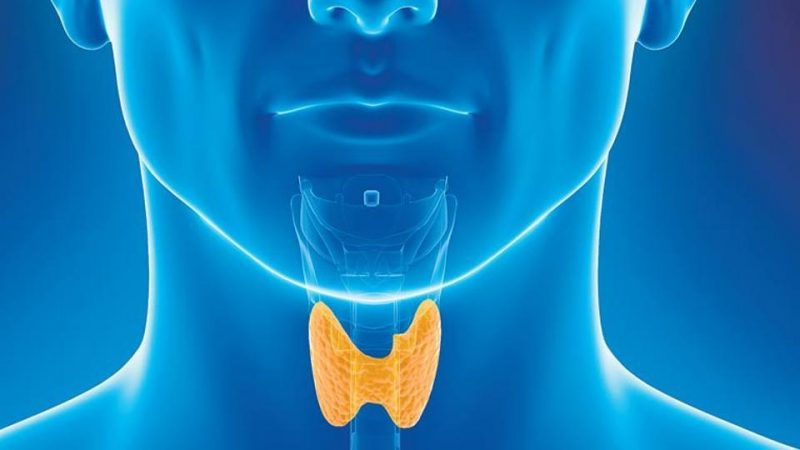Thyroid: An Overview
The thyroid, a tiny, butterfly-shaped gland situated at the base of the front of your neck, has a huge impact on your overall health. It influences the function of every organ in your body and if it is not functioning properly, it can send your body out of sync.
The thyroid gland plays a vital role in most bodily functions and regulates metabolism and body temperature.
When your thyroid is not functioning properly, it can result in a whole host of symptoms. However these symptoms may present themselves slowly and secretly, it is always crucial to listen to your body, track changes and consult to your doctor if you have any concern at all.
Hypothyroidism
Hypothyroidism happens when the gland is less active. This can happen itself at any age, but the vulnerability increases as you get older, and it is most commonly influenced by genetics. Women are three times more prone than men to develop hypothyroidism.
When you have a less active thyroid, your immune system is sparked to fight your thyroid, provoking inflammation, which leads your thyroid to produce fewer thyroid hormones. The symptoms are basically obscure and often parallel those that happen in other disorders, like iron deficiency. Hence, it can be often bewildered with other conditions that cause fatigue.
However, hypothyroidism is very easy to test for with a simple screening called thyroid-stimulating hormone (TSH) test.
What Are The Causes of Hypothyroidism
Common causes of hypothyroidism are as follows
- Hashimoto’s thyroiditis, an autoimmune disorder
- Genetics
- Low-iodine diet
- Radiation exposure from cancer treatment
- Certain medications used to treat cancer, heart problems and psychiatric conditions
- Surgical removal of the thyroid
What Are The Symptoms of Hypothyroidism
The most common symptoms of Hypothyroidism are as follows:
- Unexplained weight gain or trouble losing weight
- Fatigue
- Depression
- Hair loss and dry hair
- Muscle cramps
- Dry skin
- Goiter (swelling of the thyroid gland)
- Brittle nails
- Slow heart rate
- Irregular period
- Sensitivity to cold
- Constipation
- Carpal tunnel syndrome (pain, numbness, and tingling in the hand and arm)
What Are The Treatment For Hypothyroidism
Levothyroxine sodium tablets (aka Synthroid) can be taken once a day as a substitute hormone to help regulate thyroid levels. These tablets constitute a synthetic hormone identical to thyroxine, the hormone which the thyroid gland produces naturally.
Usually, thyroid replacement medication must be taken for life since the effects of hypothyroidism are inevitable.
Hyperthyroidism
Hyperthyroidism, at the bottom, is the opposite of hypothyroidism. It happens when the thyroid is overactive, which means producing too much thyroid hormone.
What Are The Causes of Hyperthyroidism
Common causes of hyperthyroidism consist of:
- Graves’ disease (an autoimmune condition that stimulates the thyroid hormones T4 and T3)
- Swollen thyroid
- Thyroid Nodules
What Are The Symptoms of Hyperthyroidism
The symptoms of Hyperthyroidism include:
- Unexplained weight loss
- Feeling wired or anxious
- Racing heartbeat
- Shakiness
- Sweating spells
- Feeling hot, frequently
- Itchy red skin
- More frequent bowel movements than usual
- Fine hair and hair loss
Treatment for hyperthyroidism
Methimazole or Propylthiouracil (PTU) are used to medicate hyperthyroidism. They beacon the thyroid to slow down T4 and T3 hormone production. Normally, it comes in a tablet and may be taken up to three times per day. Again, Keep in mind that this is not a cure.
What Else About Thyroidism
If anti-thyroid medications fail to regulate the thyroid, then surgery to remove all or part of the thyroid gland or radioactive iodine treatment are best alternative options used to slow the production of thyroid hormones.
If left untreated, hyperthyroidism can result in irregular heart rhythm and excessive bone loss. Majority of people respond well once hyperthyroidism is diagnosed and treated, but it is crucial to seek immediate medical care if you feel any of the hyperthyroid symptoms. This is principally true if you have an irregular heart rhythm, which can result in a life-threatening condition such as stroke.
It is helpful to know your family history because hypothyroidism is generally a genetic condition. What is more, women of childbearing age must notify their gynecologist/obstetrician of either of these conditions because they can affect the baby during pregnancy.
If any of these symptoms sound mundane, consult to your doctor. Early intervention makes medication more successful. Left untreated, a prolonged span of high or low thyroid function can result in significant health problems.



